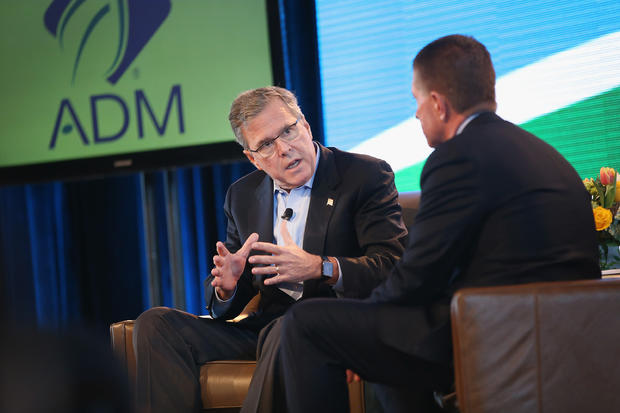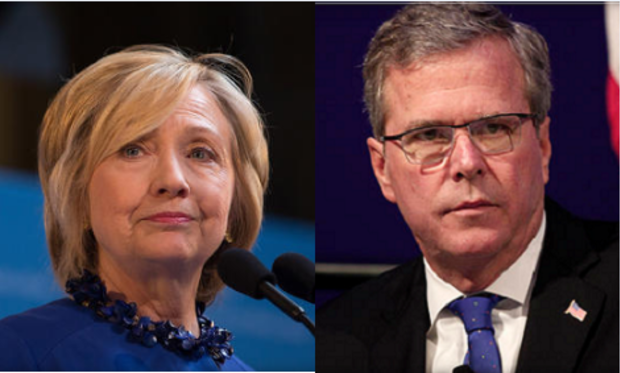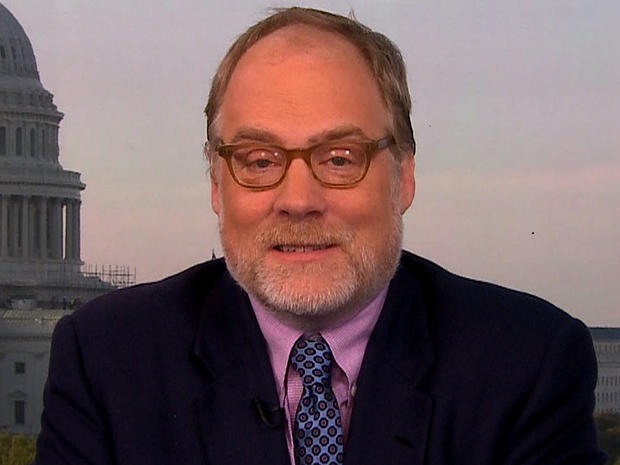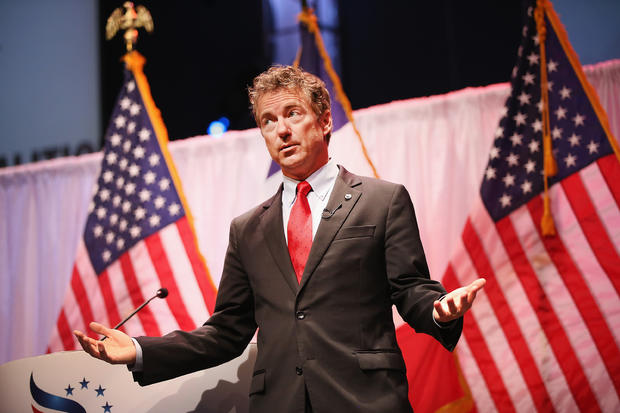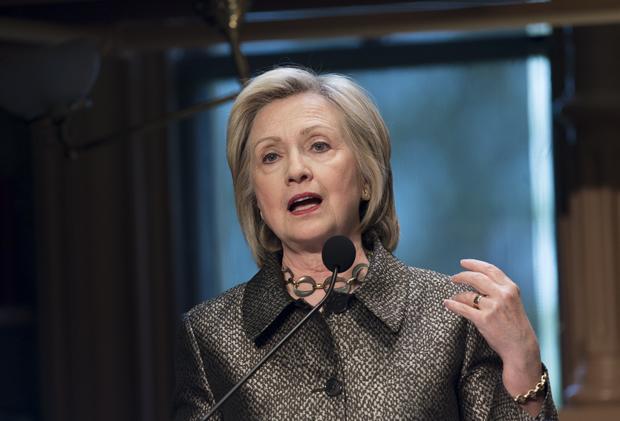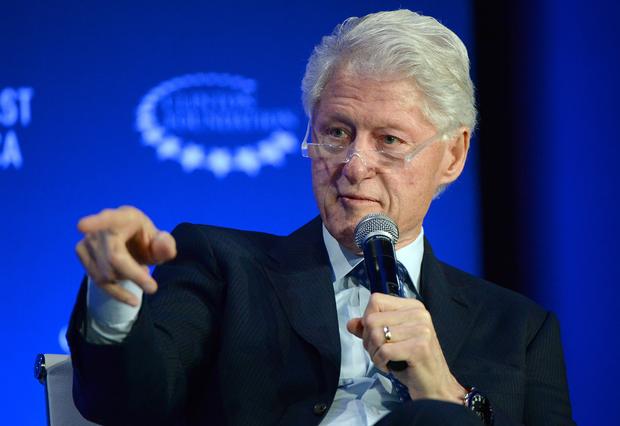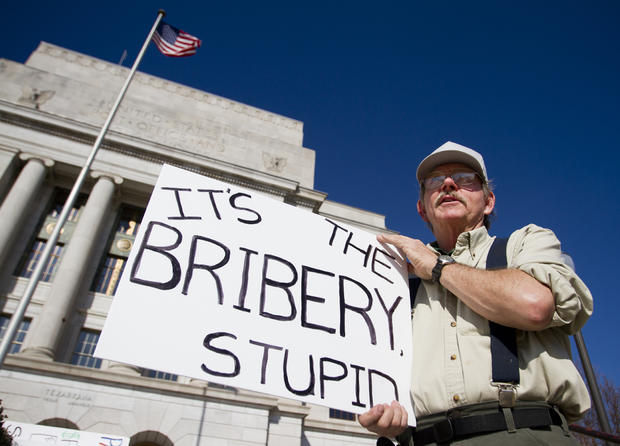Five ways 2016 candidates are testing campaign finance rules
For an individual running for federal office, the directly applicable campaign finance laws are fairly straightforward: His or her campaign can only collect $2,700 from a donor during the primary season and another $2,700 during the general election.
But already, the 2016 presidential candidates have employed several novel tactics to get around those limitations. Most of the boundary-pushing is connected to the candidates' connections to super PACs. Super PACs, according to Federal Election Commission (FEC) regulations, can raise unlimited amounts of money from individuals, corporations or groups like labor unions. The groups may promote a particular federal candidate, but they are not allowed to coordinate with a candidate or campaign.
That, however, isn't stopping the 2016 presidential candidates -- those who have already confirmed their candidacy and those still playing coy -- from finding ways to make super PACs work for them.
"We've seen this coming for a while, and we've known the FEC's concept of independence and coordination are very different from the average person's," Larry Noble, senior counsel at the Campaign Legal Center and former general counsel for the FEC, told CBS News. That said, Noble added he's surprised at "how quickly the presidential candidates have been willing to rip through the rules that were left."
Here's a look at some of the ways this election's crop of White House hopefuls are pushing the boundaries of campaign finance laws.
1. Put off becoming a candidate
Perhaps the most obvious way to avoid campaign finance laws is to not have a campaign. It's no surprise, then, that some expected 2016 candidates have yet to enter the race, even though they've been acting like candidates.
Former Florida Gov. Jeb Bush, for instance, has said repeatedly that he's still deciding whether or not to run for president. He seemed to slip up earlier this week in Reno, Nevada, when he told reporters, "I'm running for president in 2016, and the focus is going to be about how we, if I run, how do you create high sustained economic growth." As the Associated Press notes, the potential GOP contender seemed to catch his mistake mid-sentence and corrected himself.
"There's actually a legal definition of 'candidate,'" Noble pointed out. Campaign finance restrictions also apply to would-be candidates who have declared they are "testing the waters."
Noble's group has filed formal complaints against Bush, former Sen. Rick Santorum, Wisconsin Gov. Scott Walker and Maryland Gov. Martin O'Malley for acting like candidates before actually declaring themselves in the race.
2. Exploit technicalities to help super PACs raise money
Since he is not technically a candidate, there is nothing legally stopping Bush from coordinating with the Right to Rise super PAC -- even though it was established to promote his theoretical presidential campaign.
"We're assuming he's going to be a candidate, but who knows, maybe he'll decide not to run," David Keating, president of the right-leaning Center for Competitive Politics, told CBS News. "If he doesn't run, he's in a very interesting situation, as the head of a super PAC with more funds on hand than any other, which is actually not a bad place to be if you're trying to influence policy."
- How much money does Jeb Bush need to run for president?
- Hillary Clinton starts raising money for super PAC
Late last month, Bush told a group of about 350 donors assembled by the super PAC that they had already broken fundraising records. The group is aiming to raise $100 million by the end of this month.
Meanwhile, Democratic presidential candidate Hillary Clinton has also helped raise money for a super PAC designed to support her campaign -- even though, unlike Bush, she is already a declared candidate. FEC rules allow a candidate to attend a super PAC event, as long as she doesn't directly ask the donors there for more than $5,000 a person.
"This is the absurdity of the FEC," Noble said. "You have this fiction that as long as a candidate is not soliciting an actual contribution, they can be at an event where money is being solicited all around them."
3. Depend on close allies to run your super PAC
Once Jeb Bush declares his candidacy, he won't be able to exert direct control over the Right to Rise super PAC. He probably isn't too concerned about its direction, however. Bush's adviser, longtime GOP strategist Mike Murphy, may end up leading the super PAC rather than serving on Bush's campaign, the Associated Press reports.
With Murphy at the helm, the super PAC would surely adopt strategies that Bush would approve of. In fact, the AP reports that the Bush campaign plans to cede much of its basic electioneering activity -- such as advertising, voter mobilization efforts and running phone banks -- to the super PAC.
Noble said that ceding control of most campaign activities to super PACs makes the campaign finance rules governing super PACs effectively meaningless. Keating, meanwhile, noted that a super PAC can only do so much for a campaign without direct coordination.
For instance, "you wouldn't want to outsource your entire advertising," Keating said. "The most believable ads have the candidate looking at the camera saying why he wants to be president."
Depend on close allies to run your super PAC (continued)
Bush is not the only candidate giving up access to close advisers who are joining super PACs. For instance, Jesse Benton, a longtime strategist for both Rand Paul and Ron Paul (who's also married to Rand Paul's niece), is running the pro-Rand Paul super PAC America's Liberty PAC. The group's founders also include John Tate, who was a Ron Paul 2012 campaign manager and an advisor to Rand Paul's 2010 Senate campaign.
Meanwhile, Wisconsin Gov. Scott Walker's former campaign manager and chief of staff, Keith Gilkes, is joiningthe pro-Scott Walker super PAC (called Unintimidated PAC).
In fact, effectively all the 2016 candidates have links to the super PACs supporting their respective presidential bids, as the Washington Post pointed out.
This is all a far cry from the role super PACs played in the 2012 presidential election, when the super PACs supporting specific candidates really just collected a lot of big checks and ran negative ads against the competition. The Wall Street Journal observedthat "the main super PAC backing GOP nominee Mitt Romney in 2012 didn't even have a website or an aide to handle press inquiries."
4. Coordinate online communications
In perhaps the boldest test of campaign finance laws so far, a pro-Hillary Clinton super PAC, Correct the Record, plans on coordinating directly with the Clinton campaign.
How is that possible? Correct the Record points to a 2006 FEC rule that exempts "public communications" -- like emails or blog posts -- from such regulations. The rules were initially implemented as a safeguard against regulating the free speech of bloggers and other internet communications.
"The FEC rules specifically permit some activity - in particular, activity on an organization's website, in email, and on social media - to be legally coordinated with candidates and political parties," Correct the Record spokesperson Adrienne Watson said in a statement.
5. Collect "speaking fees" before the campaign (or let a spouse collect them)
It's not unusual for former federal office holders to earn large paychecks by speaking at events. Bill and Hillary Clinton are no different: After he left the White House, former President Clinton earned more than $100 million in speaking fees. Hillary Clinton, meanwhile, stepped down as secretary of state in 2013 and went on to make millions by delivering dozens of speeches.
What's unusual is that the Clintons collected many of these paychecks at a time when they still wielded significant potential influence. When Mrs. Clinton left the Obama administration, it was clear she was likely to enter the 2016 presidential race. Moreover, Mr. Clinton has every intention to keep collecting speaking fees, he told NBCearlier this month. "Oh, yeah. I gotta pay our bills," he said, noting he has turned down some speeches that could be inappropriate.
"What they're going to be very careful to do is... to make sure that there's no appearance the money is being given to influence her," Noble said. "Former presidents have gotten very large speaking fees," he continued, "but when you add that with being married to a presidential candidate, it becomes complicated."
Can we expect the FEC or Justice Department to push back?
While just about every candidate is testing the limits of campaign finance regulations, FEC chairwoman Ann Ravel recently toldthe New York Times that her agency probably won't do anything about it, due to the commission's partisan gridlock.
"The likelihood of the laws being enforced is slim," she said. "I never want to give up, but I'm not under any illusions. People think the F.E.C. is dysfunctional. It's worse than dysfunctional."
Keating said the novel approaches to fundraising aren't necessarily illegal. Furthermore, he said he doubts presidential campaigns would risk breaking the law. "If there's a credible allegation, just the allegation itself can hurt significantly," he said.
Noble, however, said the 2016 candidates are "just laughing at the laws."
"What other laws can you get away with this, where people say, 'Hey, let's not follow it anymore?'" he asked. His organization's complaint against Bush, for instance, cites the Republican's extensive travel to key voting states, as well as an email solicitation from his own mother that says, "Jeb is our best chance of taking back the White House in 2016."
Ultimately, whether ruled illegal or not, "it's money that's going to influence them," Noble said. "The average person is going to look around [at the election] and say, 'What involvement do I have in this?"
Groups like the Campaign Legal Center will continue to watch for violations of the law and file complaints with the FEC or with the Justice Department.

